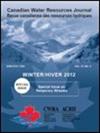加拿大野火流域风险的基线地理信息:需求、差距和机遇
IF 0.9
4区 环境科学与生态学
Q3 WATER RESOURCES
引用次数: 4
摘要
随着不断变化的森林干扰制度对供水的压力不断升级,研究人员被要求回答越来越复杂的问题。然而,由于缺乏相关数据集,野火流域风险(WWR)研究中的许多问题仍未得到解决。事实上,有许多我们不了解的基本过程需要额外的数据收集来制定风险管理框架。因此,WWR的研究人员和管理人员面临着一个悖论,他们需要在处理不完整信息的同时解决对社会水文系统可持续性至关重要的关键问题。在许多情况下,这导致有价值的研究想法被丢弃,因为有限的数据可用性。然而,不完善、不完整或有限的数据不应阻止研究人员和管理人员进行分析以评估风险。事实上,这种分析提高了现有数据的研究成本效益比,有助于解开数据源中的差距,使新假设得以产生,并突出了数据可用性和开放性可以改进的地方。如果我们不使用我们所拥有的,我们怎么知道我们需要什么?这个问题在加拿大尤其引人关注,尽管面对不断变化的野火政权,人们对水安全的担忧日益增加,但整个国家的基线WWR信息普遍缺失。在这篇评论中,我们(a)确定了几个相关的开放地理空间数据集,(b)说明了如何利用这些数据集来产生简单但相关的风险信息,(c)确定了一些需要立即关注的高优先级数据缺口,(d)讨论了创建泛加拿大WWR基线信息的未来途径。本文章由计算机程序翻译,如有差异,请以英文原文为准。
Baseline geographic information on wildfire-watershed risk in Canada: needs, gaps, and opportunities
As the pressures on water supply from shifting forest disturbance regimes continue to escalate, researchers are being asked to answer increasingly complex questions. However, many questions in wildfire-watershed risk (WWR) research remained unaddressed due to a paucity of relevant datasets. There are, indeed, many fundamental processes we do not understand that require additional data collection to develop risk management frameworks. As such, WWR researchers and managers face a paradox in their need to address critical questions important for the sustainability of socio-hydrological systems while dealing with incomplete information. In many cases, this leads to valuable research ideas being discarded on the account of limited data availability. However, imperfect, incomplete, or limited data should not deter researchers and managers from performing analyses to assess risk. In fact, such analyses improve the research benefit-to-cost ratio of existing data, help unravel gaps in data sources, enable generation of new hypotheses, and highlight where data availability and openness can be improved. If we do not use what we have, how can we know what we need? This issue is of particular interest in Canada, where baseline WWR information for the entire country is generally missing, despite growing concerns about water security in the face of a shifting wildfire regimes. In this commentary, we (a) identify several relevant open geospatial datasets, (b) illustrate how these datasets can be leveraged to produce simple yet relevant risk information, (c) identify some high priority data gaps that require immediate attention, and (d) discuss future avenues towards the creation of baseline Pan-Canadian WWR information.
求助全文
通过发布文献求助,成功后即可免费获取论文全文。
去求助
来源期刊

Canadian Water Resources Journal
WATER RESOURCES-
CiteScore
2.90
自引率
5.90%
发文量
17
审稿时长
>12 weeks
期刊介绍:
The Canadian Water Resources Journal accepts manuscripts in English or French and publishes abstracts in both official languages. Preference is given to manuscripts focusing on science and policy aspects of Canadian water management. Specifically, manuscripts should stimulate public awareness and understanding of Canada''s water resources, encourage recognition of the high priority of water as a resource, and provide new or increased knowledge on some aspect of Canada''s water.
The Canadian Water Resources Journal was first published in the fall of 1976 and it has grown in stature to be recognized as a quality and important publication in the water resources field.
 求助内容:
求助内容: 应助结果提醒方式:
应助结果提醒方式:


